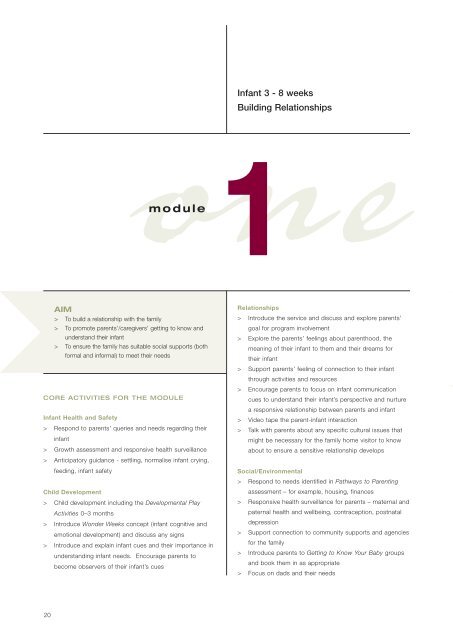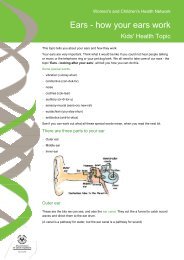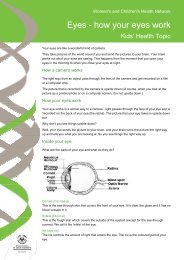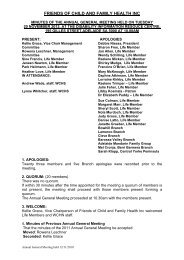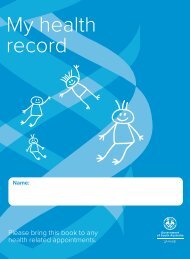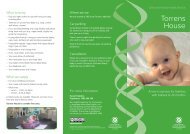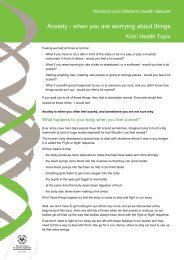Family Home Visiting - Service Outline - Child and Youth Health
Family Home Visiting - Service Outline - Child and Youth Health
Family Home Visiting - Service Outline - Child and Youth Health
You also want an ePaper? Increase the reach of your titles
YUMPU automatically turns print PDFs into web optimized ePapers that Google loves.
20<br />
AIM<br />
> To build a relationship with the family<br />
> To promote parents’/caregivers’ getting to know <strong>and</strong><br />
underst<strong>and</strong> their infant<br />
> To ensure the family has suitable social supports (both<br />
formal <strong>and</strong> informal) to meet their needs<br />
CORE ACTIVITIES FOR THE MODULE<br />
Infant <strong>Health</strong> <strong>and</strong> Safety<br />
> Respond to parents’ queries <strong>and</strong> needs regarding their<br />
infant<br />
> Growth assessment <strong>and</strong> responsive health surveillance<br />
> Anticipatory guidance - settling, normalise infant crying,<br />
feeding, infant safety<br />
<strong>Child</strong> Development<br />
> <strong>Child</strong> development including the Developmental Play<br />
Activities 0–3 months<br />
> Introduce Wonder Weeks concept (infant cognitive <strong>and</strong><br />
emotional development) <strong>and</strong> discuss any signs<br />
> Introduce <strong>and</strong> explain infant cues <strong>and</strong> their importance in<br />
underst<strong>and</strong>ing infant needs. Encourage parents to<br />
become observers of their infant’s cues<br />
one 1<br />
module<br />
Infant 3 - 8 weeks<br />
Building Relationships<br />
Relationships<br />
> Introduce the service <strong>and</strong> discuss <strong>and</strong> explore parents’<br />
goal for program involvement<br />
> Explore the parents’ feelings about parenthood, the<br />
meaning of their infant to them <strong>and</strong> their dreams for<br />
their infant<br />
> Support parents’ feeling of connection to their infant<br />
through activities <strong>and</strong> resources<br />
> Encourage parents to focus on infant communication<br />
cues to underst<strong>and</strong> their infant’s perspective <strong>and</strong> nurture<br />
a responsive relationship between parents <strong>and</strong> infant<br />
> Video tape the parent-infant interaction<br />
> Talk with parents about any specific cultural issues that<br />
might be necessary for the family home visitor to know<br />
about to ensure a sensitive relationship develops<br />
Social/Environmental<br />
> Respond to needs identified in Pathways to Parenting<br />
assessment – for example, housing, finances<br />
> Responsive health surveillance for parents – maternal <strong>and</strong><br />
paternal health <strong>and</strong> wellbeing, contraception, postnatal<br />
depression<br />
> Support connection to community supports <strong>and</strong> agencies<br />
for the family<br />
> Introduce parents to Getting to Know Your Baby groups<br />
<strong>and</strong> book them in as appropriate<br />
> Focus on dads <strong>and</strong> their needs


